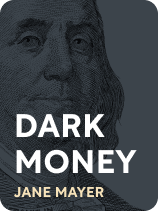

This article is an excerpt from the Shortform book guide to "Dark Money" by Jane Mayer. Shortform has the world's best summaries and analyses of books you should be reading.
Like this article? Sign up for a free trial here.
What causes have the Koch Industries supported over the years? What was behind the lawsuits against the company in the 1970s? Why did the Senate later investigate them?
In Dark Money, Jane Mayer explores how a small group of extremely wealthy individuals, led largely by Charles and David Koch, have effectively legitimized far-right beliefs in America using their massive wealth. Koch Industries, the family business, has served as the engine behind the influence.
Read more to learn about Mayer’s “dark money” history of Koch Industries from the 1970s to the 1990s.
Koch Industries in the 1970s
Mayer argues that the history of Koch Industries prior to 1970 indicates that the Kochs had been focused more on spreading free market ideas to the public and in academia. However, clashes with the government and the legal system led them to seek ways to use their power to directly influence the political sphere.
One of the biggest motivating factors for the Kochs and many others in their donor network was the new environmental and labor regulations put in place by acts like the Clean Air Act and the Toxic Substances Control Act, as well as the establishment of the Environmental Protection Agency and the Occupational Safety and Health Administration (OSHA) in 1970.
According to Mayer, corporations were disturbed by these groups’ actions and their potential harm to industrial profits. These regulations posed a threat to the fortunes of many in the Kochs’ circle, including those in the tobacco and fossil fuel industry. Some corporations—including Koch Industries—found themselves facing legal issues as a result of their practices. During these cases, the Kochs established what appeared to be a pattern of spying on and intimidating their legal opponents.
(Shortform note: We can see the Kochs’ concern for their bottom line as part of a broader trend in business of prioritizing profits over human well-being. For example, reviews of previously confidential documents show that fossil fuel companies engaged in toxic chemicals research with the explicit goal of protecting corporate interests, using research methods that were questionable at best. Documents further show that they actively suppressed research that showed the dangers of toxic chemicals that would be damaging to their corporate profits.)
Some of the lawsuits the Kochs faced related to their handling of benzene, a carcinogen that could cause leukemia. Koch Industries came under fire for failing to notify at least one employee, Donald Carlson, of abnormal results in his blood tests—which OSHA mandated they give to any employee exposed to benzene. Carlson became too sick to work and was fired by the company and given six months’ severance pay. A few years later he died of leukemia at age 53. A whistleblower also revealed that Koch Industries was exceeding the legal limit on benzene emissions by a factor of 15 and were doctoring reports to hide this fact. The whistleblower was allegedly harassed by the company in retaliation.
(Shortform note: The few years that Carlson was not informed of his abnormal test results may have had a deadly impact. Research shows that early detection of cancer greatly improves survival rates, suggesting that an earlier diagnosis may have saved or at least extended Carlson’s life. Even so, the legal limits on benzene may be insufficient for protecting the health of those who work with the chemical. Current OSHA standards limit the amount of benzene an employee can be exposed to to 5 ppm (parts per million) over 15 minutes or 1 ppm over 8 hours. However, a 2004 study indicates that there is no amount of benzene exposure that can be considered “safe.”)
Another employee who tried to alert his supervisors to the careless disposal of mercury—which employees were instructed to dispose of by pouring it in dumpsters or down the sink—was intimidated by a person claiming to be from the FBI and threatened with termination if he didn’t recant his allegations. According to Mayer, this person was later identified not as an FBI agent but as a member of Koch Industries Security.
Over the years, there were numerous other lawsuits filed against Koch Industries over their handling of toxic chemicals, their maintenance of underground pipelines, and their theft of oil from tribal land owned by Native Americans, among other things. Several individuals involved in these cases found themselves being spied on, including a lawyer whose office was bugged and an FBI agent who was tailed by a man who claimed to have been hired by Koch Industries. A member of the Senate’s investigative committee into Koch Industries’ illegal practices compared investigating the Kochs to investigating organized crime rather than a legitimate business.
(Shortform note: The use of corporate intimidation to suppress criticism has continued to grow over the past decades. These intimidation tactics include the threat of lawsuits, the costs of which are much more manageable for the corporations than for the individuals or groups they’re brought against. In other countries where American corporations operate, there has been a high rate of intimidation and even murder of people speaking out against harmful environmental and labor practices, and outcry against this violence is again often silenced through legal action designed to financially ruin opponents.)
These suits were heavily damaging to Koch Industries’ public image, but Charles Koch didn’t feel the company needed to change its practices—rather, he felt that the problem was the legal system itself, and these suits prompted him to strive to create a purely free market economy without any of the regulations that were causing his company’s problems.
| Are the Kochs’ Practices Really Based on Libertarian Principles? While the Kochs’ handling of and opposition to environmental and labor regulations was done in the name of the free market, critics may argue that their behavior was inconsistent with libertarian values. Libertarianism promotes the idea that all individuals should be able to pursue their unique interests, but only on the condition that they do not infringe on the rights—especially the property rights—of others. Some libertarian thinkers suggest that contributing to climate change does infringe on the rights of others, though there is disagreement about whether this should be corrected by regulations like pollution taxes or by increasing individual ownership of natural resources, thus incentivizing individuals to protect the environment. |
Koch Industries in the 1980s and 1990s
In 1980, the Kochs established the Mercatus Center at George Mason University, which critics described as nothing more than a lobbying group. Conservative faculty members wrote drafts of bills for issues like supply-side tax cuts that were then passed on to legislators to introduce into Congress. According to Mayer, such programs led these previously far-right ideas to be taken seriously in politics and to begin affecting legislation, just as Fink had planned.
(Shortform note: The Mercatus Center remains one of the country’s most influential libertarian think tanks. Though it officially represents itself as a nonpartisan group that doesn’t engage in lobbying, critics have noted that the group has spent hundreds of thousands of dollars on trips for government officials and suggested that it should be required to register itself as a lobbying group. Funded by millions of dollars from Koch Industries, the center also provides money and benefits to conservative media figures such as FOX News contributor Larry Kudlow.)
Though they’d previously been opposed to the Republican Party because it was too moderate, explains Mayer, the Kochs began donating heavily to Republican politicians in the 1980s and 1990s. They were among the top three financial backers of Bob Dole’s campaign against Bill Clinton for the presidency in 1996, and in return, Dole promoted legislation that saved Koch Industries millions of dollars.
(Shortform note: The Kochs may have been spurred into their explicit support of the Republican party by the Senate’s investigation into Koch Industries for the theft of oil from Indian reservations. This investigation convinced Charles Koch that he had to get involved in Washington if he wanted to protect his company. Bob Dole helped the Kochs by submitting an article to the Senate record that included a quote from the chief of one of the involved Indian tribes saying, based on information presented to them by Koch Industries, that the company had not been stealing oil from them. This article damaged the Senate’s case against the Kochs and further endeared Dole to the Kochs.)

———End of Preview———
Like what you just read? Read the rest of the world's best book summary and analysis of Jane Mayer's "Dark Money" at Shortform.
Here's what you'll find in our full Dark Money summary:
- How a group of wealthy individuals has legitimized far-right beliefs in America
- A look at Charles and David Koch's views and tactics
- The influence dark money has had on American politics and society






